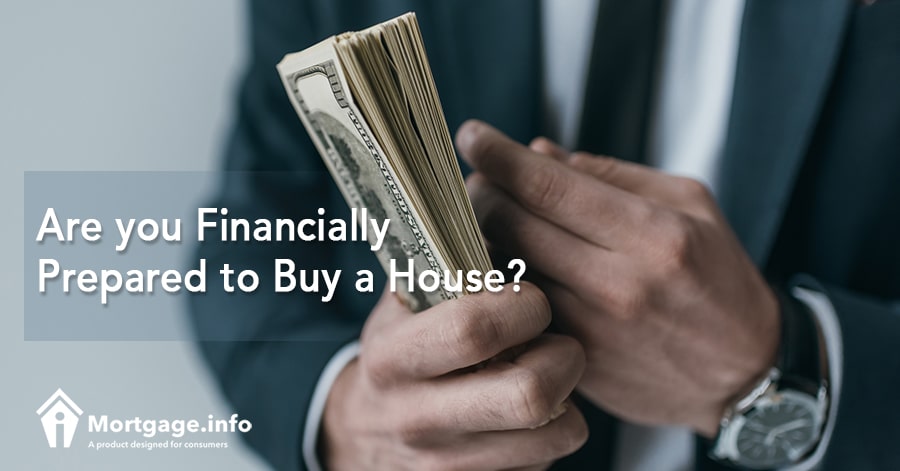You think you want a new home, but aren’t sure if you are ready. What are the signs that you are ready to buy a house?
Looking for Current Mortgage Interest Rates? Click Here.
Unfortunately, there’s no cut and dry answer. There isn’t a specific age you must be or a certain amount of money you must have.
You must do some soul searching and ask yourself the following questions. Only after serious consideration will you be able to decide if you are ready for a new home.
What’s Your Debt Level?
The very first question you must ask yourself is “How much debt do I have?” Be honest with yourself. There’s no point in lying. Do you have:
- Student loans
- Credit cards
- Auto loans
- Personal loans
- Outstanding collections
If you answered yes to any of these, you are in debt. Get yourself out before you think of buying a home. You don’t have to be completely debt free, but you should have very little debt. If you are in over your head in credit card debt, get out. You’ll need the money you pay each month towards credit cards for your home.
You might think you can afford the mortgage, so why hurry to pay off the credit cards, right? Owning a house means more than paying a mortgage. It also means paying real estate taxes, homeowner’s insurance and maintaining the home. Did you know you’ll likely spend 1% of the home’s value in annual maintenance? A $300,000 home could cost you $3,000 every year to keep it up!
Do You Have an Emergency Fund?
You might not need any assets to qualify for a loan, such as a VA or FHA loan, but you’ll want that money handy for yourself. What happens when the air conditioner breaks or your faucet leaks? You have to pay for repairs. Even if you repair it yourself, you need to buy the parts and they don’t come cheap.
What happens if something happens to your job? Your mortgage doesn’t stop – you still have to pay it each month. That’s why you want a savings account stocked before you get a mortgage. Try to have between 3 and 6 months of monthly expenses in a liquid account.
Click to See the Latest Mortgage Rates.
Having this money set aside protects you in the face of emergency. Let’s say your car breaks down and you have to pay for repairs. Would you want to choose between fixing your car and paying your mortgage? With an emergency savings account, you don’t have to choose. You can use the savings for the unexpected repairs and use your regular income for the mortgage payment.
Do You have Money for a Down Payment?
Outside of your emergency fund money, you’ll need money for a down payment. The amount varies based on the loan program you use. For example, FHA loans require 3.5% down. Conventional loans require between 5% and 20% down. The more money you put down, the lower your payment. It also gives you more equity in the home right away. The higher your equity (lower LTV), the lower your interest rate in most cases.
Aside from the down payment, you’ll also pay closing costs and fund an escrow account with a few months of your real estate taxes and mortgage insurance. Saving for the down payment and closing costs is best done long before you ever think you’ll buy a home.
Can You Afford to Buy a House?
Even if you have no debt, a stocked emergency fund, and plenty for a down payment, there’s one more big question to ask yourself. Can you afford to buy a home? This doesn’t mean on paper. A lender may qualify you for a loan based on your income, credit score, and liabilities. But, what can you afford to pay ‘in real life?’
You should keep your mortgage payment around 28% of your gross monthly income. If you make $5,000 a month, that means $1,400. This includes principal, interest, taxes, homeowner’s insurance, and mortgage insurance if applicable. You may qualify for a higher payment, but it’s not worth getting in over your head.
Now, look at your other debts. Your total debts including the new mortgage should not exceed 43% of your gross monthly income. This gives you room for daily living expenses and normal utility bills.
But, no matter how well the numbers fall into place, you need to determine how comfortable you are with the payment. Make a budget and take out the amount of the mortgage each month. How much money does it leave you with? Are you comfortable with that number?
You must take these steps to determine if you are prepared to buy a home. Just having an emergency fund or being out of debt is not enough. You have to be comfortable with the payment. Buying a home is one of the largest investments you’ll ever make. If you are not comfortable with the payment, you’ll be a high risk for default. Not biting off more than you can chew will give you the mortgage you can afford and hopefully a decent return on your investment as the home appreciates and you pay the principal down.

